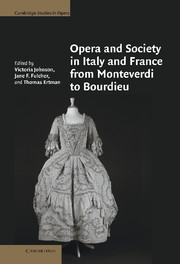Book contents
- Frontmatter
- Contents
- List of illustrations
- List of tables
- List of musical examples
- Notes on contributors
- Foreword
- Acknowledgments
- Introduction: Opera and the academic turns
- I The Representation of Social and Political Relations in Operatic Works
- II The Institutional Bases for the Production and Reception of Opera
- Introduction to Part II
- 6 State and market, production and style: An interdisciplinary approach to eighteenth-century Italian opera history
- 7 Opera and the cultural authority of the capital city
- 8 “Edizioni distrutte” and the significance of operatic choruses during the Risorgimento
- 9 Opera in France, 1870–1914: Between nationalism and foreign imports
- 10 Fascism and the operatic unconscious
- III Theorizing Opera and the Social
- Bibliography
- Index
10 - Fascism and the operatic unconscious
Published online by Cambridge University Press: 22 September 2009
- Frontmatter
- Contents
- List of illustrations
- List of tables
- List of musical examples
- Notes on contributors
- Foreword
- Acknowledgments
- Introduction: Opera and the academic turns
- I The Representation of Social and Political Relations in Operatic Works
- II The Institutional Bases for the Production and Reception of Opera
- Introduction to Part II
- 6 State and market, production and style: An interdisciplinary approach to eighteenth-century Italian opera history
- 7 Opera and the cultural authority of the capital city
- 8 “Edizioni distrutte” and the significance of operatic choruses during the Risorgimento
- 9 Opera in France, 1870–1914: Between nationalism and foreign imports
- 10 Fascism and the operatic unconscious
- III Theorizing Opera and the Social
- Bibliography
- Index
Summary
This essay unfolds from an initial working hypothesis about the absence of a discursive unconscious from pre-unification Italian cultural history in general, and from its operatic history in particular. The sense of an Italian national culture evolves with the energies of the Risorgimento: the resurgence of Italy as a modern nation, which achieved political success with unification in the decade of the 1860s. In this light, the Risorgimento might be understood as a discourse of the ego. Its equation of subjectivity with desire, emotional excess, and cultural-political subversion found conscious articulation and representation in the operatic tradition.
This energy encountered its most convincing voice in Verdi's operas and operatic style. No matter what his personal politics and commitments may have been, his operatic style fused with the Risorgimento as assertions of the ego, where inner desire and social conflict appeared as realities fully understood, inhabited, and expressed. This fusion occurred at the level of the works themselves, their musical texture, and the psychological and musical texture of their characters. Individual and collective identities – embattled lovers, outsiders, and heroes – pursue their causes against outside, foreign, or superannuated antagonists.
Through the decade of the two unifications (1860–1870), however, this cluster began to break apart. As a result, the Risorgimento, the invention of national culture, and its project of “making Italians” opened a space of anxiety about the freedom and enslavement of the national ego.
- Type
- Chapter
- Information
- Publisher: Cambridge University PressPrint publication year: 2007
- 5
- Cited by



